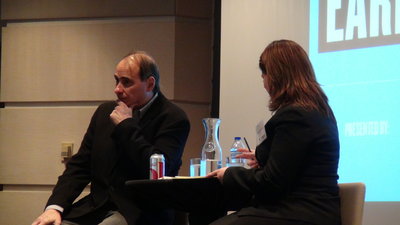The new Sun-Times sponsored news operation, Early and Often, bills itself as a “one-stop shop” for people interested in the news coming out of the city, state and the Illinois delegation in D.C. They delivered in their presentation “Youth in Politics with David Axelrod” at the University of Chicago: Gleacher Center on March 11.
“I think this is the most public-spirited generation of young people that I have ever seen since the 1960s,” Axelrod said.
Axelrod said he spends a lot of time on politics at the University of Chicago.
“The reason I started the Institute of Politics there, is because I deeply believe it’s important to engage young people in the political process,” he said.

Urban Prep student Steven Sharkey-Dye, 18, said that as a future voter, he feels that a lot of pressure is put on youth to vote, though young people don’t necessarily know who to vote for, what party to vote for, or even why they are voting.
Sharkey-Dye said that youth today should make it their duty to find out information on these politicians and the issues that they stand against, so that the next generations in line won’t have to face the same trials as youth today.
“It’s our responsibility to make the next generations’ path a little smoother,” Sharkey-Dye said. “But for this to happen we must first take our time to learn the voting process.”
Axelrod said he encourages youth to get out in their community to find a representative in public office, and learn the political structure by finding out how it works in their own neighborhood.
“These smaller campaigns are great places to learn about politics because everyone has to do everything from communications to field work, and even to fundraising,” Axelrod said. “The great thing, especially, in a small race is that everybody can make a difference.”
Wendell D. Mosby, who is a trustee at Prairie State College, said youth today shouldn’t focus on how well the political candidate is as a celebrity or social figure, but focus on the issues that the candidates are for or against.
“Youth should make the candidate line up with their issues, but a lot of times this doesn’t happen,” Mosby said. “People are attracted to these politicians not by the issues they are fighting against but by their personality.”
Mosby continued, “Yes, they might have a great personality but what’s more important to you? Is it the minimum wage hike, the affordable health care act or safer streets? Instead of focusing on what political party they’re in, I think youth today should find out who is solving their problems. We need to start educating our young people with understanding that they should support someone who believes in their issues and not just a person.”
Axelrod said he hopes youth take this process seriously because Congress is still going to make decisions that will impact their lives with or without their vote.
Axelrod explained how President George W. Bush won the presidential race in 2000 because of a recount in overtime that counted 528 more votes from Florida.
He said Bush won the election only because of those 528 people in Florida.
“If those 528 people would had rose up that day and said ‘I’m going to vote for Former Vice President Al Gore,’ then history would have been entirely different,” Axelrod said.
Axelrod said from his point of view, if those 528 people taken five minutes to vote for Gore, then we wouldn’t have gone into war with Iraq, and we probably wouldn’t have had to return the hard-earned surplus from the 90s in the form of tax cuts. But instead applied it to our debt causing us to be in a much different fiscal situation now, he said.
“These are profound differences that happened all because in this vast country of 300 million people there were 528 people in the state of Florida who decided to vote the other way,” Axelrod said.
Ian Fitzgerald, a youth voter, said young people have a big misconception that one individual vote won’t count.
“That’s not true,” he said. “It does count.”








Be First to Comment